A groundbreaking study has shown that African giant pouched rats can be effectively trained to detect scents related to illegal wildlife trafficking. Conducted by the non-profit organization APOPO, the research demonstrates the potential of these rodents as cost-effective tools in combating the illegal trade of endangered species products at ports.
The trained rats wear custom vests and alert handlers to hidden wildlife items by pulling a small ball that emits a signal. Dr. Isabelle Szott from the Okeanos Foundation, a co-author of the study, noted that these rats have previously been successful in detecting landmines and tuberculosis pathogens.
Also Read: Wildlife department busts illegal bird trade in Lahore, recovers hundreds of protected birds
“Our study shows that we can train African giant pouched rats to detect illegally trafficked wildlife, even when concealed among other substances,” she said. The training process involved several rigorous stages, starting with “indication training,” where the rats learned to recognize target scents and received rewards for accurate identifications. In the “discrimination training” phase, the rats were exposed to both target and non-target scents to teach them which odors to signal while ignoring irrelevant ones.
Szott highlighted the rats’ impressive long-term scent memory, enabling them to successfully identify scents they hadn’t encountered for months. In practical tests at the Dar es Salaam seaport, the rats excelled at detecting wildlife scents, even those masked by common household items like coffee beans and washing powder.
The custom vests used by the rats enhance their operational capabilities, featuring a microswitch that beeps when the rat pulls on a chest ball, a behavior trained during detection tasks. Szott mentioned ongoing research to explore additional functionalities for the vests, including cameras and remote signal capabilities.
Beyond wildlife detection, the rats have also been deployed successfully for landmine detection and tuberculosis screening. Szott indicated that research is ongoing to train these rats for other illegal detection tasks, including drug and arms trafficking. Their small size allows them to navigate tight spaces, making them efficient tools for inspecting packed cargo containers.
While this study marks a significant advancement in using rats for wildlife trafficking prevention, researchers acknowledge challenges ahead. The controlled environment of the study does not fully represent the complexities of real-world trafficking sites. Further development of detection protocols and hardware is essential for effective deployment in high-traffic areas.
The researchers emphasize the potential of using rats to address intertwined illegal activities, noting that wildlife trafficking often overlaps with other criminal enterprises. “Deploying rats to combat wildlife trafficking may assist with the global fight against networks that exploit humans and nature,” concluded Dr. Kate Webb, co-author and assistant professor at Duke University.









